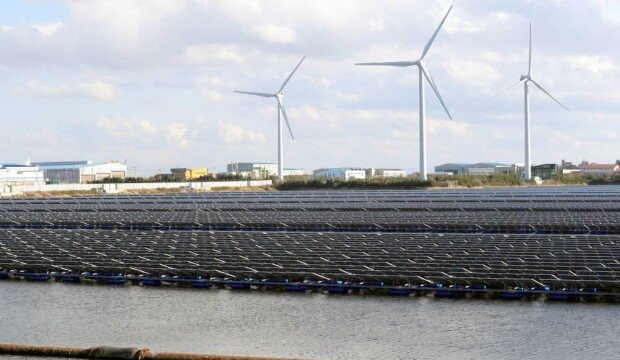Korean renewable energy firms target U.S. market
Korean renewable energy firms target U.S. market
Posted April. 30, 2025 08:07,
Updated April. 30, 2025 08:07

Korean renewable energy companies are seizing the opportunity presented by the U.S.-initiated trade war to preemptively enter the American market.
According to industry sources on April 29, the U.S. Department of Commerce recently imposed anti-dumping and countervailing duties on solar cells and panels produced in four Southeast Asian countries — Malaysia, Cambodia, Thailand, and Vietnam. The anti-dumping duties range from 6.10% to 271.28%, while the countervailing duties range from 14.64% to 3,403.96%, depending on the country and company.
As a result of this move, Chinese companies such as Trina Solar and Jinko Solar, which have been manufacturing solar products in Southeast Asia and exporting them to the U.S., are expected to take the biggest hit. In 2024, the U.S. relied on these four countries for 94.4% of its solar cell imports.
Korean solar panel companies with manufacturing plants in the U.S. are expected to benefit from these tariffs. Hanwha Solutions' Solar Hub, an integrated solar product manufacturing facility being built in Georgia, is set to be completed in the latter half of 2025, with an investment of about 3 trillion won. OCI Holdings, which already operates a solar module plant in the U.S., plans to invest an additional $265 million to produce solar cells in Texas starting in the first half of 2026.
The outlook is also positive for Korean companies in the energy storage system (ESS) industry. The Trump administration imposed tariffs of up to 145% on Chinese ESS products upon its inauguration. In 2024, Chinese firms dominated 87% of the North American ESS battery market.
As a result, Korean ESS battery manufacturers are strengthening their U.S. operations. LG Energy Solution will begin producing lithium iron phosphate (LFP) batteries for ESS in Michigan in the latter half of 2025. Samsung SDI also plans to start local production of ESS batteries in the U.S. by 2027. Sejong University Business Professor Kim Dae-jong noted that Korean ESS companies' technological capabilities will allow them to quickly replace Chinese products in the market.
In the wind power sector, LS Cable & System plans to begin producing submarine cables for wind power generation at its Virginia plant by 2028. CS Wind is already manufacturing wind power towers at its plant in Colorado, which it acquired in 2021 for more than $200 million.
한재희기자 hee@donga.com




![[천광암 칼럼]장동혁은 대체 왜 이럴까](https://dimg.donga.com/c/138/175/90/1/wps/NEWS/IMAGE/2026/02/22/133399127.1.jpg)


